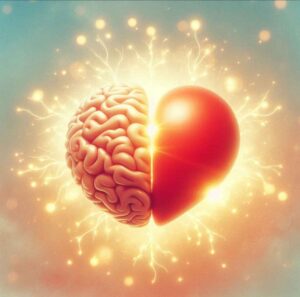Welcome Blessings!
(Tap 🔽 to see more topics!)


Love… it’s the one thing that has inspired poetry, music, and even scientific studies for centuries. It’s a force that can make you feel invincible one moment and utterly vulnerable the next. But have you ever wondered what happens to your brain and body when you fall in love? Science shows that it isn’t just a feeling. It’s a complex mix of molecules and psychological shifts that can transform how you think, feel, and even look.
Whether it lifts you to cloud nine or leaves you feeling like you’re walking on a tightrope, its effects are undeniable. But how does it affect our brain and body? Undeniably, it is an incredible emotion we humans can experience. It can make us happy, exhilarated, fixated, and even addicted. Have you ever wondered how it affects our brain and body? What happens to our cognitive abilities, health, appearance, behavior, and emotions? Below are 20 intriguing facts that reveal how it influences the brain and body, divided into good and ugly truths.
Boosts Intelligence and Creativity
Have you ever noticed how this feeling makes you see the world differently? That’s because being emotionally bonded increases dopamine levels in your brain, a neurotransmitter linked to learning, motivation, and reward. This surge of dopamine can heighten your ability to think creatively, solve problems, and even learn new skills faster.
Think of it like upgrading your brain’s operating system. You suddenly have more energy to take on challenges, whether picking up a new language to impress your partner or finding creative ways to surprise them. The mental stimulation that comes with it can help you push past your limits and tap into hidden talents. This phenomenon is an interesting aspect of the human brain and helps us understand how it can positively impact our cognitive and behavioral patterns.
Natural Stress Relievers
Experiencing romantic euphoria? The presence of a loved one lowers cortisol (the stress hormone) and increases oxytocin, often referred to as the “cuddle hormone.” Imagine coming home after a stressful day, and just a simple hug from your partner melts the tension. That’s it working its magic! Studies have shown that people in happy relationships tend to have lower stress levels and better coping mechanisms for dealing with life’s ups and downs.
Therefore, it helps you recover from illness more quickly. Similarly, some research suggests that individuals in loving relationships tend to have lower blood pressure, a stronger immune system, and a longer lifespan.

Makes You Look Younger
Have you ever noticed that people in a good romantic relationship often look glowing? That’s not just a coincidence. Love releases endorphins and boosts blood circulation, which enhances your skin’s radiance and gives you a youthful appearance. It’s like an anti-aging serum that comes from within! Smiling more, feeling happy, and experiencing affection all reduce stress-induced wrinkles and keep you looking fresh and vibrant.
Makes You Synchronize
Did you know that couples can synchronize their heartbeats? Studies have shown that partners’ heart rates can align when they are near. This magical feeling creates an invisible rhythm between two people. The more connected you feel, the more your bodies fall into sync, physically and emotionally.
Promotes Generosity and Kindness
It also increases oxytocin, fostering empathy, kindness, and generosity. When in love, people tend to be more willing to help others, donate to charities, and perform random acts of kindness. It’s like being emotionally bonded rewires your brain to focus on giving rather than just receiving. The more you love, the more generous and compassionate you become toward your partner and the world around you.
Increases Pain Tolerance
Holding hands with someone with whom you are deeply connected can reduce physical pain. It activates brain regions associated with pain relief, making discomfort more bearable. Think of it like an emotional painkiller… love can soothe even the deepest aches, whether going through a breakup or simply having a bad day.
Encourages Self-Growth
It also can transform individuals, motivating them to become better versions of themselves. It can inspire personal development, self-improvement, and greater emotional maturity.
Enhances Appearance
People in a happy romantic relationship tend to smile more often, exhibit confidence, and exude a certain radiance, making them appear more attractive, radiant, and confident. This transformation can positively impact an individual’s attractiveness towards others and their partner. Smiling is a nonverbal cue that communicates happiness, warmth, and friendliness. A glowing complexion can signify good health, vitality, and increased fertility. Confidence, on the other hand, can convey competence, charisma, and leadership qualities.
Strengthens Your Bond
When in a happy partnership, the brain releases oxytocin and vasopressin, which promote bonding, trust, and commitment. These hormones also encourage long-term devotion and monogamous relationships.
Builds Resilience
Despite its ups and downs, love fosters emotional resilience. Being loved and loving in return can help individuals overcome hardships and recover from emotional challenges more effectively.
Can Be Addictive
Being deeply connected isn’t just an emotion; it’s a powerful addiction. Studies have found that being totally into someone activates the same brain regions as drug addiction. That explains why this feeling can feel intoxicating, making you crave your partner’s presence. But just like any addiction, withdrawal can be painful. Leading to heartbreak, anxiety, and even insomnia when things go south.

Blind You to Reality
“Love is blind” isn’t just a saying; it’s backed by science. When emotionally bonded, your brain suppresses critical thinking and amplifies idealization. You might overlook flaws, ignore red flags, and view your partner as perfect. It’s as if your brain hands rose-colored glasses, making even their quirks seem charming. While this can be wonderful, it’s also a reminder to stay grounded and not ignore important relationship dynamics.
Triggers Possessiveness
While it brings joy, it can also bring jealousy. Love activates brain areas linked to territorial behavior, triggering a protective instinct when a potential rival enters the picture. It’s like having an internal alarm system that alerts you when your bond feels threatened. While mild jealousy is normal, unchecked insecurity can become toxic. Recognizing and managing these emotions is key to maintaining a healthy relationship.
Can Break Your Heart
Heartbreak isn’t just emotional; it can manifest physically. Some people experience “Broken Heart Syndrome,” a temporary heart condition caused by intense stress and emotional pain.
Spurs Risk-Taking
It stimulates the brain’s reward system, sometimes leading people to take risks they wouldn’t normally consider, from impulsive decisions to reckless actions. It can be romantic but also dangerous if not balanced with logic.
It Can Cause Anxiety
The fear of rejection, overthinking, or insecurity in a relationship can trigger the production of cortisol, the stress hormone, leading to nervousness and anxiety.
Love Can Lead to Obsession
For some, it can become an obsession. Due to overwhelming emotions, specific individuals may exhibit controlling behavior, excessive texting, or possessiveness.

Can Disrupt Sleep Patterns
When deeply in love, thoughts of a partner may consume the mind, leading to difficulty sleeping. The excitement and anticipation of love can disrupt your usual sleep patterns.
Reduces Focus and Productivity
This feeling can sometimes be a distraction, making concentrating on work or personal goals harder. It consumes mental energy and focus.
May Lead to Emotional Dependence
Some individuals become overly dependent on their partner for emotional stability, leading to an unhealthy dependency that can be detrimental if the relationship ends.
Therefore, love is more than just an emotion. It’s a force that rewires your brain and body in fascinating ways. From boosting intelligence to making you glow, it shapes who you are on a biological level. While love has its ups and downs, it remains one of the most powerful experiences we can have as humans. Whether you’re falling in love or healing from heartbreak, remember: love is always teaching you something new.
If you enjoyed this article, feel free to leave a comment below! Also, check out our budding YouTube channel, The Indestructible You, where we explore psychology, self-growth, and fascinating brain science. Thanks for reading, and I’ll see you at the next one!